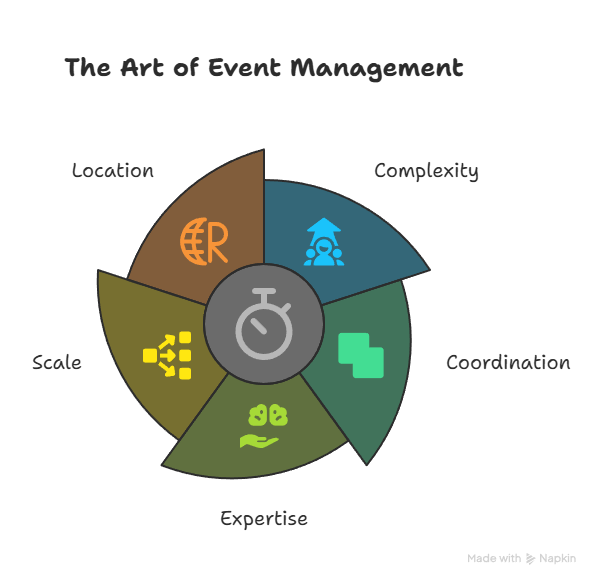Event management is the professional art of planning, executing, and evaluating events that transform ordinary gatherings into unforgettable experiences. From corporate conferences to spectacular live shows, event managers turn vision into reality.
Key Takeaways:
- Professional event management creates memorable experiences
- Comprehensive planning is crucial to success
- Technology plays a critical role in modern events
- Adaptability is key in event management
What is Event Management?
Event management is a complex profession that involves carefully coordinating every aspect of an event. Companies like BW Productions have perfected this art over decades, managing more than 9,000 events across South Africa.

Types of Events Managed
- Corporate conferences
- Social celebrations
- Live entertainment shows
- Product launches
- Team-building activities
The Importance of Professional Event Management
Why hire a professional event manager? Imagine trying to host a major conference without expert coordination. Chaos would reign! Professional event managers bring:
- Strategic Planning: Detailed timelines and budgets
- Technical Expertise: Cutting-edge technology integration
- Problem-Solving Skills: Quick resolution of unexpected challenges
- Network Connections: Reliable vendor relationships
Cost Considerations
Average event management costs in South Africa:
- Small events: R5,000 – R20,000
- Medium events: R20,000 – R100,000
- Large corporate events: R100,000 – R500,000
Essential Event Management Phases
1. Event Initiation
- Define clear objectives
- Identify target audience
- Establish event scope
2. Strategic Planning
- Budget development
- Venue selection
- Resource allocation
- Timeline creation
3. Detailed Execution
- Day-of coordination
- Vendor management
- Technical logistics
- On-site problem solving
4. Post-Event Evaluation
- Performance analysis
- Attendee feedback collection
- ROI measurement
Technology in Modern Event Management
Modern event managers leverage advanced technologies:
- Registration Platforms: Online ticketing systems
- Project Management Software: Coordination tools
- Virtual Event Technologies: Hybrid event solutions
- AI-Driven Personalization: Tailored attendee experiences
Emerging Trends
Sustainability Practices
- Digital invitations
- Eco-friendly material sourcing
- Carbon offset programs
Experiential Activations
- Immersive technologies
- Interactive event designs
- Personalized attendee experiences
Risk Mitigation Strategies
- Develop comprehensive backup protocols
- Implement cybersecurity measures
- Create health and safety regulations
- Manage vendor contracts carefully
Choosing the Right Event Management Partner
Red Flags to Watch:
- Lack of clear communication
- No proven track record
- Limited technology integration
- Inflexible approach
Selection Criteria:
- Experience in your event type
- Strong vendor network
- Technological capabilities
- Transparent pricing
Conclusion
Event management transforms ordinary gatherings into extraordinary experiences through strategic planning, technological innovation, and creative execution.
Final Tip: Always prioritize clear communication and detailed preparation for event success!
Recommended Resources: